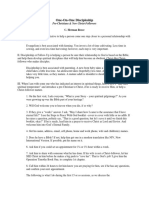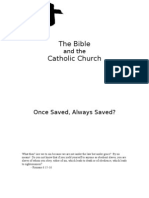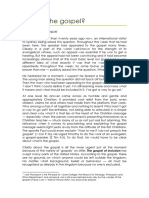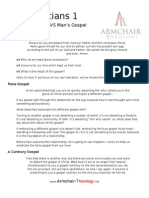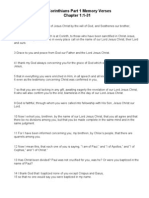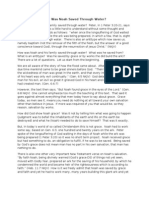1 Corinthians Part 2 Lesson #22 Chapter 15:1-11
1 Corinthians Part 2 Lesson #22 Chapter 15:1-11
Copyright:
Available Formats
1 Corinthians Part 2 Lesson #22 Chapter 15:1-11
1 Corinthians Part 2 Lesson #22 Chapter 15:1-11
Original Title
Copyright
Available Formats
Share this document
Did you find this document useful?
Is this content inappropriate?
Copyright:
Available Formats
1 Corinthians Part 2 Lesson #22 Chapter 15:1-11
1 Corinthians Part 2 Lesson #22 Chapter 15:1-11
Copyright:
Available Formats
Calvary Bible Church Firm Foundation Bible Study Lisa Hughes A Lesson #22 Page 1
1 Corinthians Part 2 Lesson #22 Chapter 15:1-11
Please read all of chapter 15 before starting your lesson and especially focus on verses 1-11. Ask the Lord to help you glean goodies from the encouraging truths in this chapter. 1. First Corinthians 15:1-11 is an interesting little section. After addressing conflicts in the church, immorality, Christian liberties, women's roles, and spiritual gifts in his letter to the Corinthians, what issue does Paul now seek to correct? See 1 Corinthians 15:1, 11-14, 15-19.
2.
Based on what you've just read, what impact would this misunderstanding of the gospel message have upon the Corinthians' faith if not corrected?
3.
Where were the Corinthians getting these ideas? See verses 12 and 35. For more on how this thinking was part of the culture of the time read Acts 17:32-34 and 26:8.
4.
What do we learn about the gospel according to verses 1-2?
5.
Let's take some time to look at each phase of the gospel's work that Paul lays out in verses 1-2. First, Paul was faithful to preach the gospel to them. Why did he do that? See Acts 15:7; 18:1-11; Romans 1:16; 1 Corinthians 1:18.
a.
How did you come to hear the gospel? At what point were your eyes opened to the lifesaving truth of the gospel? 1
Copyright 2011 Lisa Hughes
Calvary Bible Church Firm Foundation Bible Study Lisa Hughes A Lesson #22 Page 2
6.
Next, we see that the Corinthians received the gospel. What does that mean? See Romans 10:1617; 1 Thessalonians 1:6-10; 2:13.
a.
What was the manner in which you received the message of the gospel?
7.
Thirdly, we find that the Corinthians were standing in the gospel. What does Paul mean by that? See 2 Corinthians 1:24; Colossians 4:12; 1 Thessalonians 3:8.
a.
How can you tell if you are standing firm in the gospel?
8.
Verse 2 says the Corinthians were saved. What were they saved by? See verse 1 and 2 Timothy 3:15; 1 Peter 1:23-25.
9.
What is confirmation that someone is truly saved according to verse 2?
a.
What do you learn from the following verses about holding fast in the faith? See John 10:27-29; Philippians 1:6; Hebrews 10:23; 1 Peter 1:3-5; Revelation 2:13.
10.
Define vain [Strong's #1500].
11. 12.
How is it possible to believe in vain? See Colossians 2:18-19; Hebrews 4:2, 6; 11:6; James 1:21. Let's review again: What wrong thinking was influencing the church? See verse 12. 2
Copyright 2011 Lisa Hughes
Calvary Bible Church Firm Foundation Bible Study Lisa Hughes A Lesson #22 Page 3
a.
How would that wrong thinking lead to their faith being in vain? See verses 13-14, 1619.
b.
How does understanding those implications about the resurrection help explain why Paul would spend five verses (verses 4-9) identifying whom Christ appeared to when He rose from the dead?
13.
What observations can you make about Paul's preaching to the Corinthians from this part of verse 3, For I delivered to you as of first importance what I also received? Notice how 1 Corinthians 11:2, 23 and Galatians 1:12 similar.
14.
What did Paul preach to the Corinthians according to verse 3?
15.
What assurance do we have in verse 3 that Paul's preaching wasn't just something he made up? See Matthew 21:42; Romans 1:2-4; 16:25-26; 1 Peter 1:10-12; 2:6.
16.
What else did Paul preach to the Corinthians according to verse 4? See also Psalm 16:10; Luke 24:46 (Isaiah 53:4-12).
Copyright 2011 Lisa Hughes
Calvary Bible Church Firm Foundation Bible Study Lisa Hughes A Lesson #22 Page 4
17.
What impact should that phrase according to the Scriptures have upon those who were saying there was no resurrection of the dead and for those who listened to them?
18.
Not only do the Scriptures testify of Christ's resurrection, but God also provided a visual testimony of the risen Christ. Approximately how many people were eyewitnesses of the resurrection according to verses 5-9?
19.
How does Paul describe himself in verse 9? Why did he feel that way?
20.
Though he felt one way, his theology told him something else. What did his doctrinal understanding teach him? See verse 10. How did that motivate him?
21.
There were many things in Paul's previous life that he was ashamed of, yet the grace that God extended to him intensely motivated Paul. Consider verse 10 in light of your life: By the grace of God I am what I am. His grace toward me did not prove vain. I labored even more than all of them. Yet it wasn't me. It was the grace of God with me. How has God's grace effected you? Also consider how 2 Corinthians 5:14-15 is similar to verse 10.
In this revealing verse let us take note of three things: the evidence of grace, I am what I am; the power of grace, labored more abundantly than they all; the fellowship of grace, the grace of God which was with me. All that he now is can be traced to grace. The transformation in his life was due to a power outside of himself; the persecutor was now the
Copyright 2011 Lisa Hughes
Calvary Bible Church Firm Foundation Bible Study Lisa Hughes A Lesson #22 Page 5
preacher, preaching the faith he once destroyed (Gal. 1:23). ~Jack Hunter1 22. Who is the they referring to in verse 11? How does the consistency of the message preached, no matter who it came from, provide another reason why the Corinthians should believe in the resurrection?
23.
This section of Paul's letter is just picking up steam as he moves toward his triumphant conclusion, and though the information is foundational, we've learned some valuable truths to aid us in our daily walk with the Lord. What truths have encouraged you from verses 1-11?
The resurrection of Christ was the Father's expression of satisfaction in the work His Son so blessedly accomplished on the cross, when He gave Himself a ransom for our sins. We need to remember that apart from His physical resurrection there was no proof that God had accepted His work as an atonement for our sins. ~H. A. Ironside2
Jack Hunter, 1 Corinthians: What the Bible Teaches, Ritchie New Testament Commentaries. Scotland, John RitchieLtd., 1986. Pg. 186. 2 H. A. Ironside, The First Epistle to the Corinthians. Loizeaux Brothers: Neptune, New Jersey, 1938. Pg. 463. 5 Copyright 2011 Lisa Hughes
You might also like
- Be Encouraged (2 Corinthians): God Can Turn Your Trials into TriumphsFrom EverandBe Encouraged (2 Corinthians): God Can Turn Your Trials into TriumphsNo ratings yet
- The Holy Rosary With Litany BookfoldDocument4 pagesThe Holy Rosary With Litany BookfoldNica Nealega CresciniNo ratings yet
- T530 Midterm ExamDocument9 pagesT530 Midterm ExamChristopher David Belson83% (12)
- Colossians 1 Study GuideDocument5 pagesColossians 1 Study GuideKen Aisa OrtizNo ratings yet
- Lyric Send Me Search EngineDocument5 pagesLyric Send Me Search Enginebrittany_gombocNo ratings yet
- Colossiansseries DabbsDocument9 pagesColossiansseries DabbsstephanieNo ratings yet
- 1 Cor Part 2 L#19 14 20-33Document5 pages1 Cor Part 2 L#19 14 20-33A Firm Foundation Bible Studies at Calvary Bible Chruch, Burbank, CANo ratings yet
- Second Corinthians- Teach Yourself the Bible Series: Keys to Triumphant LivingFrom EverandSecond Corinthians- Teach Yourself the Bible Series: Keys to Triumphant LivingNo ratings yet
- 1 Corinthians Part 2 Lesson #12 Chapter 12:1-11Document5 pages1 Corinthians Part 2 Lesson #12 Chapter 12:1-11A Firm Foundation Bible Studies at Calvary Bible Chruch, Burbank, CANo ratings yet
- Reflection Questions: "The Core Value of The Gospel" (1 Corinthians 15:1-9)Document2 pagesReflection Questions: "The Core Value of The Gospel" (1 Corinthians 15:1-9)NewCityChurchCalgary100% (1)
- 1 Cor Part 2 L#24 15 29-49Document5 pages1 Cor Part 2 L#24 15 29-49A Firm Foundation Bible Studies at Calvary Bible Chruch, Burbank, CANo ratings yet
- 1 Cor Part 2 L#23 15 12-28Document5 pages1 Cor Part 2 L#23 15 12-28A Firm Foundation Bible Studies at Calvary Bible Chruch, Burbank, CANo ratings yet
- Exposing The Modern Versions Attack On The Gospel of Our SalvationDocument62 pagesExposing The Modern Versions Attack On The Gospel of Our SalvationJasper Dwight AntonioNo ratings yet
- Galatians- Teach Yourself the Bible Series: The Epistle of Christian LibertyFrom EverandGalatians- Teach Yourself the Bible Series: The Epistle of Christian LibertyNo ratings yet
- The EkklesiaDocument62 pagesThe EkklesiaErnest UdomNo ratings yet
- Evangelize?, Why Should We Evangelize?, How Should We Evangelize?Document16 pagesEvangelize?, Why Should We Evangelize?, How Should We Evangelize?niyi206No ratings yet
- Colossians & Philemon- Teach Yourself the Bible SeriesFrom EverandColossians & Philemon- Teach Yourself the Bible SeriesRating: 4.5 out of 5 stars4.5/5 (5)
- One-On-One Discipleship: Pre-Christians & New Christ-FollowersDocument18 pagesOne-On-One Discipleship: Pre-Christians & New Christ-FollowersAYSON N. DELA CRUZNo ratings yet
- The Letter To The PhilippiansDocument5 pagesThe Letter To The PhilippianssogunmolaNo ratings yet
- First Corinthians-Teach Yourself the Bible Series: Order in the ChurchFrom EverandFirst Corinthians-Teach Yourself the Bible Series: Order in the ChurchNo ratings yet
- First & Second Timothy & Titus-Teach Yourself the Bible SeriesFrom EverandFirst & Second Timothy & Titus-Teach Yourself the Bible SeriesNo ratings yet
- Thyatira - The Tolerant Church: I. Looking To God's WordDocument7 pagesThyatira - The Tolerant Church: I. Looking To God's WordAnita WopaNo ratings yet
- 1 Corinthians Part 2 Lesson #2 Chapter 9:1-18Document4 pages1 Corinthians Part 2 Lesson #2 Chapter 9:1-18A Firm Foundation Bible Studies at Calvary Bible Chruch, Burbank, CANo ratings yet
- 1cor PhilDocument104 pages1cor Philorozcoernesto505999No ratings yet
- Latter-Day Saint Doctrine in The BibleDocument23 pagesLatter-Day Saint Doctrine in The BibleJonas NzimaNo ratings yet
- GLC Book 3 Session 2 - MCDCDocument25 pagesGLC Book 3 Session 2 - MCDCFranco Rafael Cuaresma-dela Cruz100% (1)
- 1 Corinthians Bible Study NotesDocument134 pages1 Corinthians Bible Study Notesshellygreen_16100% (8)
- ONEGOD, Part OneDocument6 pagesONEGOD, Part OneMattBGNo ratings yet
- Gospel Issues in AdventismDocument149 pagesGospel Issues in AdventismsingoekipnyckzNo ratings yet
- Colossians Part 1Document5 pagesColossians Part 1Douglas_Kofi_A_9691No ratings yet
- 1 Corinthians Part 2 Lesson #16 Chapter 13:6-13Document7 pages1 Corinthians Part 2 Lesson #16 Chapter 13:6-13A Firm Foundation Bible Studies at Calvary Bible Chruch, Burbank, CANo ratings yet
- 1 Corinthians Part 2 Lesson #9 Chapter 11:1-16Document6 pages1 Corinthians Part 2 Lesson #9 Chapter 11:1-16A Firm Foundation Bible Studies at Calvary Bible Chruch, Burbank, CANo ratings yet
- Sabbath School LessonDocument10 pagesSabbath School LessonEuphonyGHNo ratings yet
- 1 CorinthiansDocument176 pages1 CorinthiansCharisNo ratings yet
- The Gospel and The PoorDocument16 pagesThe Gospel and The PoorBruce Lawrence MadeirosNo ratings yet
- Prophetic From The CenterDocument43 pagesProphetic From The CenterWN&T BRASILNo ratings yet
- Things That Differ-Cornelius StammDocument188 pagesThings That Differ-Cornelius StammAurora LightSky100% (1)
- Philippians Chapter 1 QuestionsDocument11 pagesPhilippians Chapter 1 QuestionsYee Tak NganNo ratings yet
- The Letter To The ColossiansDocument4 pagesThe Letter To The ColossianssogunmolaNo ratings yet
- Prayer: Finding The Pulse of GodDocument21 pagesPrayer: Finding The Pulse of Goditisme_angela0% (1)
- Once Saved Always SavedDocument5 pagesOnce Saved Always Savedapi-3732481No ratings yet
- What Is The GospelDocument10 pagesWhat Is The Gospelsummerbefore11thgradeNo ratings yet
- Repentance from Dead Works: Foundation doctrines of Christ, #1From EverandRepentance from Dead Works: Foundation doctrines of Christ, #1No ratings yet
- Tim Keller On The Poor PDFDocument15 pagesTim Keller On The Poor PDFMiguel DavillaNo ratings yet
- Means of Grace (Class)Document15 pagesMeans of Grace (Class)Ray NearhoodNo ratings yet
- Church History ContentDocument6 pagesChurch History ContentowiswellNo ratings yet
- The Fullness of Christ 1st EdnDocument38 pagesThe Fullness of Christ 1st EdnJoao BaptistaNo ratings yet
- Book of Philippians Chap 3 and 4Document10 pagesBook of Philippians Chap 3 and 4LynNo ratings yet
- Foundations - TeacherDocument7 pagesFoundations - Teachergagler5998No ratings yet
- Odyssey of Grace: The New Testament in Review, from Matthew to GalatiansFrom EverandOdyssey of Grace: The New Testament in Review, from Matthew to GalatiansNo ratings yet
- 2023 Chronicle 1118 19Document2 pages2023 Chronicle 1118 19charlotteNo ratings yet
- Galatians 1 Study OutlineDocument4 pagesGalatians 1 Study OutlineDaveNo ratings yet
- An Invitation to Explore the Bible: Hidden Gems and TreasuresFrom EverandAn Invitation to Explore the Bible: Hidden Gems and TreasuresNo ratings yet
- 2 CorinthiansDocument122 pages2 Corinthianssatish2k2No ratings yet
- Essential Questions ft. Bible - Augustin AnnaDocument4 pagesEssential Questions ft. Bible - Augustin AnnaVijetha YCNo ratings yet
- Clement and The CorinthiansDocument1 pageClement and The CorinthiansA Firm Foundation Bible Studies at Calvary Bible Chruch, Burbank, CANo ratings yet
- 1 Corinthians Part 2 Lesson #16 Chapter 13:6-13Document7 pages1 Corinthians Part 2 Lesson #16 Chapter 13:6-13A Firm Foundation Bible Studies at Calvary Bible Chruch, Burbank, CANo ratings yet
- 1 Corinthians Part 2 Lesson #14 Chapter 13 OverviewDocument3 pages1 Corinthians Part 2 Lesson #14 Chapter 13 OverviewA Firm Foundation Bible Studies at Calvary Bible Chruch, Burbank, CANo ratings yet
- 1 Corinthians Part 2 Lesson #25 Chapter 15:50-58Document4 pages1 Corinthians Part 2 Lesson #25 Chapter 15:50-58A Firm Foundation Bible Studies at Calvary Bible Chruch, Burbank, CANo ratings yet
- 1 Cor Part 2 L#24 15 29-49Document5 pages1 Cor Part 2 L#24 15 29-49A Firm Foundation Bible Studies at Calvary Bible Chruch, Burbank, CANo ratings yet
- 1 Cor Part 2 L#15 13 1-5Document8 pages1 Cor Part 2 L#15 13 1-5A Firm Foundation Bible Studies at Calvary Bible Chruch, Burbank, CANo ratings yet
- 1 Corinthians Part 2 Lesson #26 Chapter 16 OverviewDocument5 pages1 Corinthians Part 2 Lesson #26 Chapter 16 OverviewA Firm Foundation Bible Studies at Calvary Bible Chruch, Burbank, CANo ratings yet
- 1 Cor Part 2 L#20 14 34-40Document6 pages1 Cor Part 2 L#20 14 34-40A Firm Foundation Bible Studies at Calvary Bible Chruch, Burbank, CANo ratings yet
- 1 Corinthians Part 2 Lesson #21 Chapter 15 OverviewDocument7 pages1 Corinthians Part 2 Lesson #21 Chapter 15 OverviewA Firm Foundation Bible Studies at Calvary Bible Chruch, Burbank, CANo ratings yet
- 1 Corinthians Part 2 Lesson #17 Chapter 14 OverviewDocument6 pages1 Corinthians Part 2 Lesson #17 Chapter 14 OverviewA Firm Foundation Bible Studies at Calvary Bible Chruch, Burbank, CANo ratings yet
- 1 Cor Part 2 L#23 15 12-28Document5 pages1 Cor Part 2 L#23 15 12-28A Firm Foundation Bible Studies at Calvary Bible Chruch, Burbank, CANo ratings yet
- 1 Corinthians Part 2 Lesson #18 Chapter 14:1-19Document6 pages1 Corinthians Part 2 Lesson #18 Chapter 14:1-19A Firm Foundation Bible Studies at Calvary Bible Chruch, Burbank, CANo ratings yet
- 1 Cor Part 2 L#10 11 17-34Document6 pages1 Cor Part 2 L#10 11 17-34A Firm Foundation Bible Studies at Calvary Bible Chruch, Burbank, CANo ratings yet
- 1 Corinthians Part 2 Lesson #1 Introduction, Review, and Chapter 9 OverviewDocument6 pages1 Corinthians Part 2 Lesson #1 Introduction, Review, and Chapter 9 OverviewA Firm Foundation Bible Studies at Calvary Bible Chruch, Burbank, CANo ratings yet
- 1 Cor Part 2 L#8 CH 11 OverviewDocument6 pages1 Cor Part 2 L#8 CH 11 OverviewA Firm Foundation Bible Studies at Calvary Bible Chruch, Burbank, CANo ratings yet
- 1 Cor Part 2 L#13 12 12-31Document5 pages1 Cor Part 2 L#13 12 12-31A Firm Foundation Bible Studies at Calvary Bible Chruch, Burbank, CANo ratings yet
- 1 Corinthians Part 2 Lesson #11 Chapter 12 OverviewDocument6 pages1 Corinthians Part 2 Lesson #11 Chapter 12 OverviewA Firm Foundation Bible Studies at Calvary Bible Chruch, Burbank, CANo ratings yet
- I Cor Lesson #22 Chapter 7 OverviewDocument8 pagesI Cor Lesson #22 Chapter 7 OverviewA Firm Foundation Bible Studies at Calvary Bible Chruch, Burbank, CANo ratings yet
- I Cor Memory Verses Chapter 1Document2 pagesI Cor Memory Verses Chapter 1A Firm Foundation Bible Studies at Calvary Bible Chruch, Burbank, CANo ratings yet
- 1 Corinthians Part 2 Lesson #7 Chapter 10:23-33: For or Therefore Is Used) in Verses 1, 12, and 14Document5 pages1 Corinthians Part 2 Lesson #7 Chapter 10:23-33: For or Therefore Is Used) in Verses 1, 12, and 14A Firm Foundation Bible Studies at Calvary Bible Chruch, Burbank, CANo ratings yet
- 1 Corinthians Part 2 Lesson #9 Chapter 11:1-16Document6 pages1 Corinthians Part 2 Lesson #9 Chapter 11:1-16A Firm Foundation Bible Studies at Calvary Bible Chruch, Burbank, CANo ratings yet
- 1 Corinthians Part 2 Lesson #3 Chapter 9:19-27Document5 pages1 Corinthians Part 2 Lesson #3 Chapter 9:19-27A Firm Foundation Bible Studies at Calvary Bible Chruch, Burbank, CANo ratings yet
- 1 Corinthians Part 2 Lesson #6 Chapter 10:14-22Document4 pages1 Corinthians Part 2 Lesson #6 Chapter 10:14-22A Firm Foundation Bible Studies at Calvary Bible Chruch, Burbank, CANo ratings yet
- 1 Corinthians Part 2 Lesson #5 Chapter 10:1-13Document5 pages1 Corinthians Part 2 Lesson #5 Chapter 10:1-13A Firm Foundation Bible Studies at Calvary Bible Chruch, Burbank, CANo ratings yet
- Psalm 63 Memory VerseDocument1 pagePsalm 63 Memory VerseA Firm Foundation Bible Studies at Calvary Bible Chruch, Burbank, CANo ratings yet
- I Cor Lesson #26 Chapter 8 OverviewDocument5 pagesI Cor Lesson #26 Chapter 8 OverviewA Firm Foundation Bible Studies at Calvary Bible Chruch, Burbank, CANo ratings yet
- 1 Corinthians Part 2 Lesson #2 Chapter 9:1-18Document4 pages1 Corinthians Part 2 Lesson #2 Chapter 9:1-18A Firm Foundation Bible Studies at Calvary Bible Chruch, Burbank, CANo ratings yet
- 1 Cor Part 2 L#4 CH 10 OverviewDocument6 pages1 Cor Part 2 L#4 CH 10 OverviewA Firm Foundation Bible Studies at Calvary Bible Chruch, Burbank, CANo ratings yet
- Spiritual Freedom: ST - Thomas AquinasDocument17 pagesSpiritual Freedom: ST - Thomas AquinasAngelo Villanueva100% (1)
- PSALM 19 Meaning Verse by VerseDocument6 pagesPSALM 19 Meaning Verse by VerseQuennie Abellon QuimanNo ratings yet
- Last Time in RE .: Non Religious Arguments For Life After Death Such AsDocument28 pagesLast Time in RE .: Non Religious Arguments For Life After Death Such AsJUJANo ratings yet
- DIVINE INTERVENTION AND BREAKTHROUGH SERVICE - YouTubeqAaAaDocument1 pageDIVINE INTERVENTION AND BREAKTHROUGH SERVICE - YouTubeqAaAaSamgruebtzNo ratings yet
- Baptism by Katherine VazDocument1 pageBaptism by Katherine VazKathrine CruzNo ratings yet
- PTI 2023 - The Nicene Creed NotebookDocument83 pagesPTI 2023 - The Nicene Creed NotebookLeslie CañeteNo ratings yet
- His Appearing-Alyce McPhersonDocument4 pagesHis Appearing-Alyce McPhersontLzmS23No ratings yet
- Notes On John Keble and The True Spirit of Catholic ImaginationDocument3 pagesNotes On John Keble and The True Spirit of Catholic ImaginationTim GadenNo ratings yet
- How Was Noah Saved Through WaterDocument3 pagesHow Was Noah Saved Through Waterdlee7067No ratings yet
- A Legacy of FaithDocument2 pagesA Legacy of FaithAndrewNo ratings yet
- The Parable of The Wise and Foolish BuildersDocument10 pagesThe Parable of The Wise and Foolish BuildersRian Hanz AlbercaNo ratings yet
- Two Age Eschatology ColorDocument1 pageTwo Age Eschatology ColorjasiscoNo ratings yet
- Shepherding Counseling and Sustainability (A)Document2 pagesShepherding Counseling and Sustainability (A)david rajNo ratings yet
- EucharistDocument3 pagesEucharistEmily VennenNo ratings yet
- Eclesiology Module 1Document2 pagesEclesiology Module 1Jhon Marven Valiente ReyesNo ratings yet
- Orthodox Reformed Dialogue and The EcumeDocument18 pagesOrthodox Reformed Dialogue and The EcumeNazim DjedaaNo ratings yet
- Yes and AmenDocument2 pagesYes and AmenBernNo ratings yet
- The CrossDocument5 pagesThe CrossKathrine Dyan MarquezNo ratings yet
- How I Live 1. Living Up To The Gospel Ephesians 4:1-3 Martyn Lloyd-Jones Called The Paul's Letter To The Ephesians "The Most SublimeDocument11 pagesHow I Live 1. Living Up To The Gospel Ephesians 4:1-3 Martyn Lloyd-Jones Called The Paul's Letter To The Ephesians "The Most SublimeJames GikingoNo ratings yet
- The Fullness of FaithDocument4 pagesThe Fullness of FaithTMOT - The Message of TransfigurationNo ratings yet
- A Brief History of The RosaryDocument5 pagesA Brief History of The Rosarysibagat.parishNo ratings yet
- Hyper GraceDocument2 pagesHyper GraceSunday UgochukwuNo ratings yet
- Being Holy As A Christian YouthDocument12 pagesBeing Holy As A Christian YouthPHILIP ADDONo ratings yet
- Sacraments and SacramentalsDocument3 pagesSacraments and SacramentalsKrisha AvorqueNo ratings yet
- Send The FireDocument2 pagesSend The FirePhil LaegerNo ratings yet
- Biodata Arnel For Yahweh GloryDocument2 pagesBiodata Arnel For Yahweh GloryClergyArnel A CruzNo ratings yet
- 2 Chronicles 7 14 Is Not For UsDocument4 pages2 Chronicles 7 14 Is Not For UsDeborah L. (Kuzenski) CollinsNo ratings yet


















